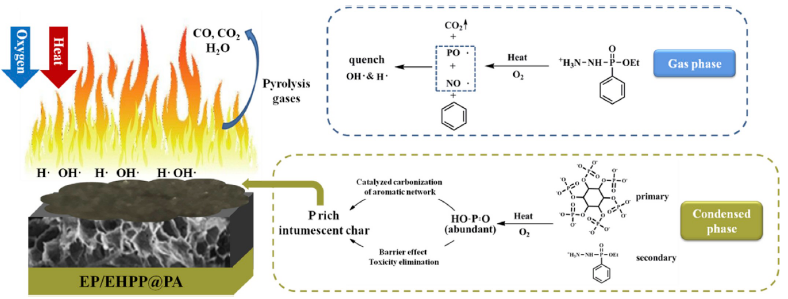A paper entitled “A bio-based ionic complex with different oxidation states of phosphorus for reducing flammability and smoke release of epoxy resins”, which was written by the R&D team of advanced flame-retardant polymer materials from the School of Biological and Chemical Engineering and published in the journal Composites Communications (impact factor 4.915) in February this year, has been recently identified as an ESI (Essential Science Indicators) highly cited paper. FANG Fang, a doctoral student supervised by Professor FANG Zhengping, Dean of the School, and Associate Professor RAN Shiya of the School, is the paper’s first author, with RAN and Dr. SONG Ping’an from the University of Southern Queensland (Australia) being the corresponding authors.
The study focuses on a novel highly efficient biomass-derived flame retardant (EHPP@PA) with different oxidation state phosphorus which is prepared via neutralization of phytic acid (PA) and phenylphosphonate-based compound (EHPP). Due to synergistic effect between PA and EHPP, the incorporation of EHPP@PA significantly improves the flame-retardant performances of epoxy resin (EP) and also displays excellent smoke suppression performance (as shown in the figure below). The study has been supported by the Cooperative Research Fund for Overseas and Hong Kong-Macao Scholars of the National Natural Science Foundation of China (NSFC), NSFC General Program Fund and NSFC Youth Program Fund.
The R&D team of advanced flame-retardant polymer materials from the School of Biological and Chemical Engineering, under the leadership of Professor FANG Zhengping, Dean of the School, has delivered numerous academic results, including a 2019 ESI highly cited paper entitled “Improved flame resistance and thermo-mechanical properties of epoxy resin nanocomposites from functionalized graphene oxide via self-assembly in water” published in Composites Part B: Engineering (impact factor 6.964).
